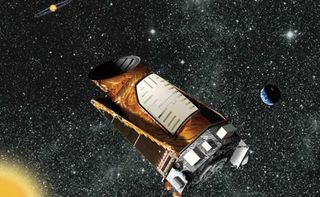Kepler Telescope Glitch Briefly Sidelines Its Planet Hunt

NASA's planet-hunting Keplerspacecraft is back on trackafter a glitch this week cost it about 13 hours of lost time forscience.
The space telescope has been orbitingthe Earth since March2009, searching for signs of alienplanets around other stars.
During a check-in with the spacecrafton Monday (Dec. 13),scientists found that Keplerhad switched to the wrong guidance system for determining in whichdirection topoint. Instead of being in finepoint attitude mode, which allows thetelescopeto target stars with fine accuracy, Kepler was in coarse pointattitude. Thismode uses star trackers for pointing, rather than the fine guidancesensorsmounted to the telescope.
Engineers were initially unsure whatcaused the issue.
"They determined that Keplerfailed to transition properly from coarse point to finepoint attitudeafter apre-planned momentum wheel de-saturation," a regular maneuver thespacecraft makes to stay in the right orbit, according to a NASArelease.
"The project team was able to recoverthe spacecraft tofinepoint relatively quickly," the statement said. "Only 13 hours ofscience data collection were interrupted by this anomaly."
The mission budgets for some timelost due to scheduledmaintenance interruptions and anomalies, and project leaders saidKepler wasstill on track with its science goals. [Gallery:Strangest Alien Planets]
Get the Space.com Newsletter
Breaking space news, the latest updates on rocket launches, skywatching events and more!
"The mission remains well within thebudget outagesallowed," the statement said.
Astronomers have found more than 500extrasolar planetsaround alien stars, and Kepler has aided the search. In particular,Kepler isaiming to find Earth-likealien planets that might have the right characteristics tohostextraterrestrial life.
- Video? Hunting Alien Earths: Kepler Stares at Stars
- Top10 Most Intriguing Extrasolar Planets
- How Kepler Searchesfor Exoplanets
Join our Space Forums to keep talking space on the latest missions, night sky and more! And if you have a news tip, correction or comment, let us know at: community@space.com.

Clara Moskowitz is a science and space writer who joined the Space.com team in 2008 and served as Assistant Managing Editor from 2011 to 2013. Clara has a bachelor's degree in astronomy and physics from Wesleyan University, and a graduate certificate in science writing from the University of California, Santa Cruz. She covers everything from astronomy to human spaceflight and once aced a NASTAR suborbital spaceflight training program for space missions. Clara is currently Associate Editor of Scientific American. To see her latest project is, follow Clara on Twitter.
